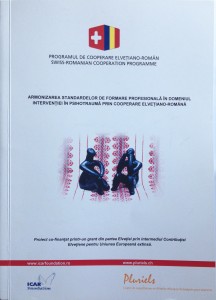Training handbook launch
Yesterday, 28 November 2016, took place the launching of a training handbook that summarizes the Swiss-Romanian transfer of expertise, offering guidance and practical advice to specialists engaged in the psycho-traumatology field. The event was organised within the closing conference of the project ”Harmonization in Professional Development Standards in Psycho-trauma Intervention through Swiss-Romanian Cooperation”, co-financed by a grant from Switzerland through the Swiss Contribution to the enlarged European Union.
This publication is a course support, the fist part being dedicated to the course ”Elements of psycho-traumatology in case of severe traumas (torture and other inhuman and degrading treatments)”, delivered by Radu Teodorescu, MD psychiatrist.
The course approaches, on one hand, the issue of trauma from a theoretical point of view, mainly from the perspective of cognitive-behavioral approach and the theories of neurobiology, and on the other hand, it brings up the less known issue of severe trauma and its long-term and trans-generational consequences. Also, it advances basic information regarding the vicarious traumatization which the specialists working with these categories of clients are exposed to. This module aims at providing the skills and knowledge for psychologists and psychotherapists who are active or want to specialize in psychological assistance for persons who have experienced severe traumas like severe torture, serious abuses, inhuman and degrading treatments.
The second part of the training handbook is deditated to the course ”Introduction in emergency psychology”, delivered by the Swiss psychologist Alfredo Camelo.
Emergency psychology’s role is to accompany and support those affected and those around them, immediately after the occurrence of a potentially traumatic event. Emergency psychological intervention purposes to activate resources that have left in the individual, family, group or community in order to restore mental and social well-being and therefore to prevent further mental deterioration. Above all it means to support and accompany those have been in distress to help them keep in touch with “life”, to keep faith in people and their hope for the future. In order to accomplish this, the emergency psychologist mobilizes resources in managing the emotions of all those affected. This approach is based on the principle of “to do as little as possible, but to do everything necessary”. The course emphasizes and explores the importance of immediate psychological assistance and describes the various tools and methods that can be used by specialists.










